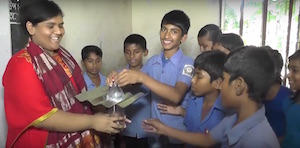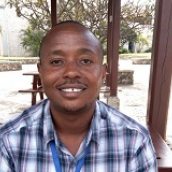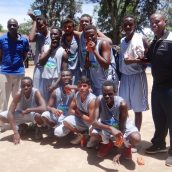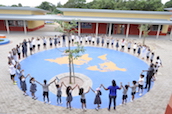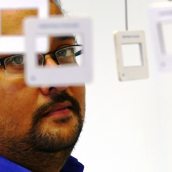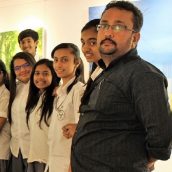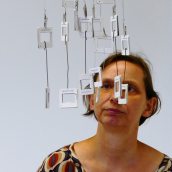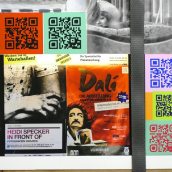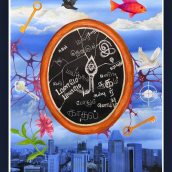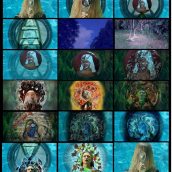Jazz Concert
The Aga Khan Academy Maputo will be hosting a jazz concert on 3 May. For more details, please contact the Academy.
End of 2023-2024 academic year
Last day of school at the Aga Khan Academy Maputo will be on 12 June. Classes will finish at 14:15.
2024-2025 academic year
The 2024-2025 academic year for the Aga Khan Academy Maputo will start on 8 August 2024.
Book Character Day
The Aga Khan Academy Maputo will celebrate will celebrate a virtual Book Character Day on Friday, 1 November 2024.
Nanjiba Sayara: Teaching students in Bangladesh to recycle plastic
My desire was realised through the grade 10 International Baccalaureate (IB) Middle Years Programme (MYP) personal project, a community project that focuses on service learning through practical exploration and a cycle of inquiry, action and reflection. As part of my personal project, I went to a village school in Bangladesh where I taught a group of about 20 students how to recycle plastic bottles, and the importance of such an activity. I chose to focus on this, because recycling plastic is needed to keep our environment safe and it’s a fun activity that would keep the students interested. Please click here to see a video of my experience at the village school.
I was privileged to work with those students, as they were very enthusiastic to learn and contribute. Spending one day with children from different backgrounds made me a better communicator. My parents and I have always believed that extracurricular activities are as important as academics because they contribute to being a balanced individual. I am happy to have done this activity at the village school because it made learning enjoyable and therefore memorable.
The IB MYP personal project was challenging, educational and exciting. My parents always ask me to share my happiness and knowledge with others because it might brighten up someone’s day. I believe my session at the village school accomplished this, so I wish to continue sharing my knowledge, what I have learned and will continue to learn, with my society.
Jimnah Kimani David: Promoting diversity through sports
“I think one of the biggest assets the Academy has is the diverse cultural background in the student body. Having players coming from all over the world from so many walks of life adds a unique element to playing as a team.”
Coach Jimnah Kimani At the Aga Khan Academy (AKA) Mombasa, Jimnah Kimani David wears a lot of different hats. He is the administrative assistant to the vice principal Diploma Progamme, the assistant sports coordinator, as well as a year 6 mentor. However, he is probably best known on campus in his capacity as the open boys’ basketball team coach.Early in his life, Jimnah had never planned to coach a high school basketball team. “I was originally going to go into accounting,” he said. “I later realised I wanted to work with people, and more importantly, with children, which is why I decided to go into education.”
However, he was not entirely inexperienced in his capacity as a basketball coach. Before he graduated in 1999, Jimnah had already begun helping out his high school basketball coach at Mombasa Baptist High School. He was initially taken on as an informal translator for their Texan coach, Stan Littleford, but he quickly became a valuable mentor and role model for the younger players on the team. From then, he grew from strength to strength, eventually leading his team to win two national titles as a player, and one as a coach in 2007.
His stellar coaching skills did not go unnoticed. In the 2012–2013 off-season, Jimnah was approached to take on a role coaching the AKA Mombasa open boys’ basketball team. “I felt I had proven myself as a coach with Mombasa Baptist. But they are an established, well-known basketball school. I relished the challenge of taking on a fresh team and starting with them from scratch.”
Jimnah joined the Academy in August 2012. He had learned about the school from his brother Charles Mwangi Waweru, who attended the Academy and graduated in 2009. “What drew me to the institution was the commitment the Academy had to providing facilities for excellent education to students from all backgrounds,” he reflects.
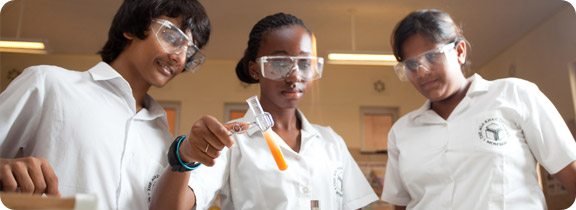
Middle Years Programme
The Senior School of the Aga Khan Academy, Maputo, when it opens will be an IB World School offering the Middle Years Programme (MYP) of the International Baccalaureate (IB).
Skills for Learning and Life
The Middle Years Programme caters for students in years 7 through 11 (ages 11-16). Students in the MYP are immersed in a challenging and enriching educational environment which emphasises the mastery of basic skills, the ability to analyse and think critically, the development of self-discipline and good work habits, the acquisition of computer literacy and progressive skill development.
The MYP helps students develop an awareness of how they learn best, of thought processes and learning strategies. The programme also encourages student reflection and connections with real world issues. It includes a service component designed to encourage students to become aware of community needs, and to learn from their involvement in carefully organised service activities.
The Curriculum
The MYP integrates the study of the major disciplines, including languages, sciences, literature, social sciences, mathematics, arts, technology and physical education. The five AK curricular strands, which are unique to the Aga Khan Academies, are integrated throughout the curriculum.
Students’ final performance in the MYP is assessed by teams of teachers and validated by the IB through a process of careful external monitoring and moderation of student grades. This process ensures parity of standards across some 600 MYP schools worldwide.
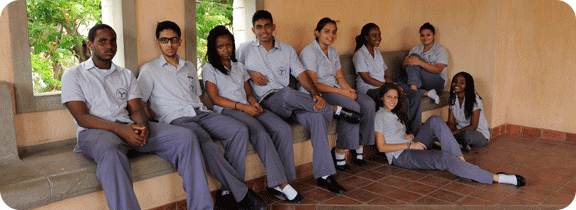
Quick Facts about the Academy
The Aga Khan Academy Mombasa (established 2003)
Location: Kizingo area of Mombasa Island
Campus size: 18 acres of land; campus design inspired by local Swahili architecture
Curriculum
The Aga Khan Academy Mombasa is an International Baccalaureate (IB) World School
IB programmes:
- Primary Years Programme: years 1–5
- Middle Years Programme: years 6–10
- Diploma Programme: years 11–12
Aga Khan Curricular Strands, implemented across the curriculum:
Ethics, Pluralism, Cultures (with an emphasis on Muslim civilisations), Governance and Civil Society, and Economics for Development
Staff and students
Faculty numbers: 7 senior management, 70 Senior School faculty, 27 Junior School faculty, 104 administrative staff
Number of students currently enrolled: 687 day and residential students in total: 181 day students in the Junior School; 506 day and residential students in the Senior School, with 270 in residence
Numbers of students and teachers at full capacity: 750 students and 90 teachers, with over 30% of students receiving some form of financial aid
First IB Diploma Programme graduating class: 2007
Residential students
Number of residential students: 270 currently, with full capacity of 300 students
Number of students per room: Between 1 and 4, with second year Diploma Programme students in single or double rooms
Residential facilities: Student lounge with large-screen television, study areas, laundry facilities, dining hall
Campus facilities
Sports facilities: 25-metre swimming pool, diving pool, full-sized sport field, Astroturf field, gym,
three regulation-sized basketball courts, cricket pitch, tennis courts, squash courts, badminton court, volleyball court, netball court and junior play area
Arts facilities: Rooms for fine arts, music, dance; individual music practice booths; music recording area; amphitheatre performance space
Academic areas: Junior School classrooms, Senior School classrooms, science and computer laboratories, multiple-award-winning library and resource centre, arts facilities, music and dance studios
Residential buildings: Six residential blocks: three male and three female; 4–6 dorm parent apartments in each block. Each block has a central atrium, lounge area, ocean view, patio and laundry facilities
Technology: The Aga Khan Academy Mombasa has been named a Microsoft Showcase School, the only school in East Africa to receive this designation
Professional Development Centre
The Aga Khan Academy Mombasa is home to a Professional Development Centre for the advancement of teachers. The primary objective of this centre is to provide professional development that will benefit the wider school system in Kenya.
Programming began in June 2010 with a Professional Learning for Educators Series for teachers in local government, independent and not-for profit schools.
Through the Microsoft Showcase Schools programme, the Aga Khan Academy Mombasa shares ideas globally and supports other schools in Kenya to improve learning and student outcomes through technology.
The Aga Khan Academies network
18 Academies are planned in South and Central Asia, Africa and the Middle East.
3 Academies are currently operating: Mombasa, Kenya (opened 2003); Hyderabad, India (opened 2011); and Maputo, Mozambique (opened 2013).
When complete, the network will represent 2,000 teachers and 14,000 students (boys and girls), with 1,400 graduates annually.
Institutional partnerships include:
Agencies of the Aga Khan Development Network; universities including Harvard, Oxford, Toronto and University of California, Los Angeles; secondary schools including Phillips Academy, Andover, USA and Schule Schloss Salem, Germany.
Happy New Year from the Aga Khan Academies
Dear friends of the Aga Khan Academies,
Happy New Year to you and your families from all of us at the Aga Khan Academies.
As we look toward 2018, I’m pleased to share with you some of the exciting developments that the Academies are anticipating for the coming year.
Across the Aga Khan Development Network, we will be continuing to celebrate the Diamond Jubilee of His Highness the Aga Khan, marking 60 years of his enlightened leadership as the Imam of the Ismaili Muslims and founder of the AKDN. The Jubilee commemorations began on 11 July 2017 and will continue until July 2018. The Aga Khan Academies have been running two social media initiatives in honour of the Diamond Jubilee – Academies ‘Journeys’ and ‘60 Stories for 60 Years’ – and these will continue through this July. I hope you are enjoying them.
The Jubilee year marks a time of increasing expansion of the Aga Khan Academies. Construction of the full campus for our third Academy in Maputo, Mozambique has proceeded rapidly, and our students and staff are looking forward to the opening of the beautiful new school buildings that will house students from grades 3–7 in the very near future. The Academy in Maputo also expanded their curricular offering this academic year, having introduced the International Baccalaureate (IB) Middle Years Programme, which has been received very well by our students and teachers.I’m also very pleased to share that our fourth Aga Khan Academy in Dhaka, Bangladesh will begin construction in 2018. The design for the forthcoming Academy won the award for best ‘Future Education’ project at the World Architecture Festival 2017. We’re looking forward to seeing the vision behind the award-winning design come to life, to provide talented students from Bangladesh and the region with a world-class education, regardless of their socioeconomic background.
In 2018 we will also be celebrating 15 years of the Aga Khan Academies network, with our first Academy in Mombasa, Kenya having opened in 2003. During the past 15 years, the Academies have pioneered innovative approaches in a multitude of areas, including the cross-curricular Aga Khan Strands, approaches to leadership development and service learning, campus design for a well-rounded education, talent identification, and developing local teachers into IB practitioners, amongst others. As our network grows, we are continuing to see the power of becoming a global, closely integrated and pluralistic learning community that allows sharing of ideas, expertise and thinking across varied contexts and cultures.
We greatly value your support for the Aga Khan Academies and our collective effort towards creating a better future through education.
Wishing you and your families the very best for 2018.
Warm regards,
Salim A.L. Bhatia
Director of Academies
Visual Arts Educator Models Lifelong Learning
Vijayaraghavan Srinivasan is a prolific painter and video artist whose work explores the intersection between self and society. He facilitates IB Visual Arts at the Academy, in his words, “aimed at developing a strong formalistic and aesthetic understanding as a basis for unique personal expressions in my students. I believe the post-modernist approach to teaching Visual Arts enables students to rediscover the intelligence towards relationships by creating links with multiple disciplines and capitalise on imaginative novelty.”
Over the last decade, he has participated widely in various biennales, video festivals, and art residency programs across India and the world. This allows him to gain insights into contemporary art styles and enhance his pedagogical strategies in teaching art appreciation to promote creativity, critical thinking and encourage artistic independence along with a spirit of inquiry.
“For seven years,” Vijay tells us, “I have had the wonderful opportunity to instruct a diverse group of primary, middle and senior school students. I encourage and expect my students to be confrontational towards themselves as well as towards what they are seeing, to always question – never settle, and to be aware of the wonder that can be revealed by the creation of a work through honesty, passion and empathy.”
In 2016, Vijay’s piece The Trinity Saga was published by Aesthetica Magazine in the UK. The Aesthetica Artists Directory is a global network of artists engaging with the professional art world through forums for discussions and interactivity both in the print and digital spheres, where the best in emerging art from around the world has a chance to be discovered.
Proving that he embodies the philosophy of lifelong learning, in the summer of 2016 Vijay attended an advanced-level visual arts course at the Berlin Art Institute Studio Program, which is closely tied to the IB Diploma Programme art curriculum. The course work offered advanced-level studio art practice and experimentation with mixed media. “The avant-garde art practices and experiments with unconventional processes further enhanced my understanding of contemporary art practice,” says Vijay, “and focused on producing artwork in a transdisciplinary way, with compassion and responsibility as key themes.”
After the course, Vijay had the opportunity to work on a collaborative project with Kelly Reedy, an American experimental artist who specialises in art therapy. Labelled Under the Ageis, the mixed media video installation explored the archaic myth of Medusa in relationship to the primal aspects and duality of the ‘great mother’ and ‘terrible mother’ archetypes. Reedy’s research into psychological theories concerning the quality of the attachment of the primary care giver or “mother” in relation to the development of her child’s security and sense of self, accentuate her exploration of the transformative powers of the creative process in art to heal and make whole again.
“I encourage my students to develop a strong formalistic and aesthetic understanding of art as a basis for expressing their own personal vision,” says Vijay. “I encourage each of them to grow on their own, to be free to make mistakes, to push themselves in ways that their work takes them. I feel that self-directed education is inevitably the best way to guide young people in their education as students of art.”
